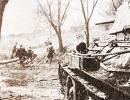Presentation on history on the topic "Greek colonies on the shores of the Mediterranean and Black Seas." Greek colonies on the shores of the Mediterranean and Black Seas Presentation of Greek colonies on the shores of the Mediterranean and Black Seas
Slide 1
Slide 2
 600 BC, the ancient Greeks, representatives of one of the unique Civilizations of the world, landed on the territory of the ancient Scythians. Less wealthy Greeks, who did not have land, decided to develop the territories of the Black Sea region. Growing bread, viticulture, mining gold, copper and iron - all this was their main goal. In addition, they looked for markets for their goods. All this suited the newcomers and for almost 600 years, in friendship with the Scythian kings, they built, traded, and created.
600 BC, the ancient Greeks, representatives of one of the unique Civilizations of the world, landed on the territory of the ancient Scythians. Less wealthy Greeks, who did not have land, decided to develop the territories of the Black Sea region. Growing bread, viticulture, mining gold, copper and iron - all this was their main goal. In addition, they looked for markets for their goods. All this suited the newcomers and for almost 600 years, in friendship with the Scythian kings, they built, traded, and created.
Slide 3
 The main reason for colonization Rapid population growth The amount of land per capita was decreasing Problems with food
The main reason for colonization Rapid population growth The amount of land per capita was decreasing Problems with food
Slide 4
 The resettlement was organized. The authorities of the policy organized reconnaissance expeditions and appointed persons responsible for organizing the departure and founding of the colony. Thus, they controlled the entire colonization process. Colonization - the development and settlement of new territories inside or outside one’s country
The resettlement was organized. The authorities of the policy organized reconnaissance expeditions and appointed persons responsible for organizing the departure and founding of the colony. Thus, they controlled the entire colonization process. Colonization - the development and settlement of new territories inside or outside one’s country
Slide 5
 Before a long journey, future colonists visited the Delphic Temple. If the predictions of the gods were unfavorable, then the departure was postponed. If life in the new place was going well, a delegation of colonists visited their former hometown with rich gifts.
Before a long journey, future colonists visited the Delphic Temple. If the predictions of the gods were unfavorable, then the departure was postponed. If life in the new place was going well, a delegation of colonists visited their former hometown with rich gifts.
Slide 6
 They moved in groups of 100–200 people. These were people who knew each other well. As a rule, from the same city. They brought with them cattle, weapons, seeds, a handful of soil from their homeland and fire. On the way to their new homeland, many dangers awaited them - storms, disease, hunger and cold, pirates. The average speed of the Greek ship was 9 - 10 km per hour.
They moved in groups of 100–200 people. These were people who knew each other well. As a rule, from the same city. They brought with them cattle, weapons, seeds, a handful of soil from their homeland and fire. On the way to their new homeland, many dangers awaited them - storms, disease, hunger and cold, pirates. The average speed of the Greek ship was 9 - 10 km per hour.
Slide 7
 But now all the hardships of the journey are behind us. The settlers chose a convenient place near the harbor or at the mouth of the river, on a hill. They poured earth brought from their homeland under their feet. They laid a fire on it and set it on fire, which they carefully guarded during their hectic journey. After this, they made a sacrifice to the gods as a sign of gratitude and with hope for the future. Then they divided the land into flat areas for arable land and for grazing livestock. They built temples and dwellings. The city was surrounded by walls. Having settled in, they transported women, children and the elderly. Thus began a new life in a new place.
But now all the hardships of the journey are behind us. The settlers chose a convenient place near the harbor or at the mouth of the river, on a hill. They poured earth brought from their homeland under their feet. They laid a fire on it and set it on fire, which they carefully guarded during their hectic journey. After this, they made a sacrifice to the gods as a sign of gratitude and with hope for the future. Then they divided the land into flat areas for arable land and for grazing livestock. They built temples and dwellings. The city was surrounded by walls. Having settled in, they transported women, children and the elderly. Thus began a new life in a new place.
Slide 8
 Ancient cities. built in the southern and eastern parts of modern Ukraine and southern Russia: Nikonium, Arpis, Kremnisk, Fisca, Epolion, Aegissus, Bosporus, Tiritak, Korokondama, Hermonassa, Patreus, Kazeka, Heraclius, Tiramba, Achillius, Ilurat, Nymphaeum, Myrmekiy, Kepy , Porthmius, Parthenius, Zenon-Chersonese, Temryuk, Kitey, Acre, Epolion, Istres, Phanagoria, Tyra, Tanais The largest Scythian-Greek cities built 2600 -2500 years ago: Olbia - Ochakov; Chersonesos - Sevastopol; Nikopol - Nikopol Feodosia - Feodosia; Kerkinitida - Evpatoria; Scythian Naples - Simferopol; Panticopeia – Kerch: Istr – Belgorod-Dnestrovsky; Karkinit – Skadovsk district; Mariupol - Mariupol Melitopol - Melitopol Kremny - Preslav; Heracles – Shchelkino
Ancient cities. built in the southern and eastern parts of modern Ukraine and southern Russia: Nikonium, Arpis, Kremnisk, Fisca, Epolion, Aegissus, Bosporus, Tiritak, Korokondama, Hermonassa, Patreus, Kazeka, Heraclius, Tiramba, Achillius, Ilurat, Nymphaeum, Myrmekiy, Kepy , Porthmius, Parthenius, Zenon-Chersonese, Temryuk, Kitey, Acre, Epolion, Istres, Phanagoria, Tyra, Tanais The largest Scythian-Greek cities built 2600 -2500 years ago: Olbia - Ochakov; Chersonesos - Sevastopol; Nikopol - Nikopol Feodosia - Feodosia; Kerkinitida - Evpatoria; Scythian Naples - Simferopol; Panticopeia – Kerch: Istr – Belgorod-Dnestrovsky; Karkinit – Skadovsk district; Mariupol - Mariupol Melitopol - Melitopol Kremny - Preslav; Heracles – Shchelkino
Slide 9
 The Greek colonists did not break ties with the hometown from which they sailed. They called it the metropolis - the mother city. If a colonist returned to his homeland, he was given all the rights of a citizen. At the same time, the new cities were completely independent of the metropolises. The largest metropolis was the city of Miletus in Asia Minor. He founded several dozen colonies. Sparta founded only one colony. And not a single one - Athens.
The Greek colonists did not break ties with the hometown from which they sailed. They called it the metropolis - the mother city. If a colonist returned to his homeland, he was given all the rights of a citizen. At the same time, the new cities were completely independent of the metropolises. The largest metropolis was the city of Miletus in Asia Minor. He founded several dozen colonies. Sparta founded only one colony. And not a single one - Athens.
Slide 10
 4. Consequences of colonization. Colonization had a huge impact on the entire ancient Greek world. It contributed to the development of the economy, trade and shipbuilding. Grain, slaves, livestock, salt, and raw materials (wood and metals) were exported from the colonies to the metropolis. Goods and things that the colonists could not initially produce themselves were brought to the colonies from Greece: handicrafts, olive oil, wine. Greece Imported Exported
4. Consequences of colonization. Colonization had a huge impact on the entire ancient Greek world. It contributed to the development of the economy, trade and shipbuilding. Grain, slaves, livestock, salt, and raw materials (wood and metals) were exported from the colonies to the metropolis. Goods and things that the colonists could not initially produce themselves were brought to the colonies from Greece: handicrafts, olive oil, wine. Greece Imported Exported
Slide 11

Slide 12
 Colonization expanded the boundaries of the ancient Greek world. The Hellenes densely populated the coast of Southern Italy and Sicily, as well as Southern France and Spain. They founded large colonies on the northern shores of the Black Sea - the territory of modern Russia and Ukraine. This contributed to the expansion of the Greeks' knowledge of the world around them. The Hellenes met peoples who differed from them in language, customs, religion and culture. They called everyone who spoke an incomprehensible language barbarians (from the onomatopoeic “bar-var”). And the Persians, and the Egyptians, and the inhabitants of Babylonia, not to mention the backward tribes. The word barbarian meant “stranger”, “not Hellenic”. Over time, the Greeks began to consider themselves better than others and that they were superior in everything to the barbarians born for slavery. Thus, colonization played an important role in the development of Ancient Greece. It contributed to the rise of economic life, trade and shipbuilding, and the formation among the Greeks of a sense of belonging to a single people.
Colonization expanded the boundaries of the ancient Greek world. The Hellenes densely populated the coast of Southern Italy and Sicily, as well as Southern France and Spain. They founded large colonies on the northern shores of the Black Sea - the territory of modern Russia and Ukraine. This contributed to the expansion of the Greeks' knowledge of the world around them. The Hellenes met peoples who differed from them in language, customs, religion and culture. They called everyone who spoke an incomprehensible language barbarians (from the onomatopoeic “bar-var”). And the Persians, and the Egyptians, and the inhabitants of Babylonia, not to mention the backward tribes. The word barbarian meant “stranger”, “not Hellenic”. Over time, the Greeks began to consider themselves better than others and that they were superior in everything to the barbarians born for slavery. Thus, colonization played an important role in the development of Ancient Greece. It contributed to the rise of economic life, trade and shipbuilding, and the formation among the Greeks of a sense of belonging to a single people.
Slide 13
 Questions and tasks: 1. Why were many Greeks forced to leave their native lands? 2. Describe in words the path to the new homeland and show on the map the places where the Hellenes settled. 3. Who and how did the formation of colonies benefit? 4. During sea voyages, the Greeks painted the ship’s hull, sail and rigging blue. Think about what purpose they did this?
Questions and tasks: 1. Why were many Greeks forced to leave their native lands? 2. Describe in words the path to the new homeland and show on the map the places where the Hellenes settled. 3. Who and how did the formation of colonies benefit? 4. During sea voyages, the Greeks painted the ship’s hull, sail and rigging blue. Think about what purpose they did this?
History lesson in 5th grade on the topic "Greek colonies on the shores of the Mediterranean and Black Seas"
Completed by Omelchenko S.A., teacher of history and social studies
MCOU Kopenkinskaya Secondary School

1. Choose the correct answer.
Spartans:
a) were the original inhabitants of Laconia, a region in Southern Greece;
b) at the invitation of the original inhabitants they came to Laconia;
c) conquered Laconia and subjugated its original inhabitants to their power.
2. Choose the wrong answer.
In the Greek states, Sparta was famous as a country in which:
a) art flourished;
b) all residents were subject to almost military discipline and strict order;
c) babies recognized by the elders as not healthy enough were thrown from a mountain cliff into the abyss.
3. Continue the list.
Sparta was governed by:
a) council of elders...
4 . Find the odd one out.
Spartan boys:
a) persistently studied literacy and writing;
b) spent hours learning war songs;
c) from the age of seven they lived separately from their parents in groups of peers;
d) were famous for their ability to speak beautifully and for a long time.
5 . Name the concept that matches the definition.
Slaves who belonged to the Spartan state:
c) archons.





Greek colonies
Directions of Greek colonization





Vocabulary work:
Pirates – sea robbers.
Marble – a hard, shiny stone, usually with a beautiful design.
Heaton – Greek clothing similar to a shirt.
Himation – an oblong piece of fabric in which the Greeks wrapped themselves when leaving the house.
Ellin – Greek.
Hellas - Greece.


THE COLONY. REASONS FOR COLONIZATION Colony - (Latin colonia) - in ancient times - a settlement founded by citizens of the metropolis on free or conquered lands. Reasons for colonization: 1. rapid demographic growth 2. lack of land 3. acute political struggle between the nobility and the demos, defeat in which forced the losers to move to a new place 4. urban merchants and artisans hoped to establish trade with the country where the new colony was being created.



THESE DIRECTIONS ARE COMBINED INTO 3 GROUPS OF DIRECTIONS: 1. WESTERN (MOST ACTIVE IN THE NUMBER OF COLONIES RECOVERED), 2. NORTHEAST (SECOND IN ACTIVITY), 3. SOUTH. SOMETIMES IT HAPPENED THAT THE COLONISTS FAILED TO ESTABLISH A COLONY IN THE DESIRED PLACE, AND THEY HAD TO CHANGE NOT ONLY THE PLACE, BUT ALSO THE REGION OF THE COLONY (FOR EXAMPLE, THE COLONISTS FROM ERETRIAN WHO FAILED TO ESTABLISH A COLONY ON KERKYROS, OS WE NEWED A COLONY IN THrace). IN THE CASE OF HOMOSITY OF METROPOLITAN POLIS, A LESS STRONG POLIS COULD BE FORCED TO STOP COLONIZATION EVEN IF IT EXISTED (FOR EXAMPLE, THE MEGARS WERE FORCED TO LIMIT THEM TO ONLY ONE COLONY FOR A LONG TIME BECAUSE OF THE OPPOSION OF THEIR THEIR OPPONENTS - CHALKIDS AND CORINTH. THEY PARTICIPATED IN THE COLONIZATION OF THE 8-6 CENTURIES POLICIES THAT WERE COLONIES NOT SO LONG LONG ago (FOR EXAMPLE, MILETS, WHO ESTABLISHED UP TO 90 COLONIES ON THE SHORES OF THE BLACK SEA). IN ADDITION, POLICIES ESTABLISHED DIRECTLY DURING THE PERIOD OF THE GREAT GREEK COLONIZATION PARTICIPATED (FOR EXAMPLE, AKRAGANT, FOUNDED GELOI AND THE COLONIES OF SYRACUSE).Directions of Colonization

THE CREATION OF NUMEROUS COLONIES PROMOTED THE DEVELOPMENT OF TRADE. THE COLONIES EXPORTED GRAIN (PRIMARY FROM Magna GREECE AND THE BLACK SEA REGION) AND COPPER (CYPRUS) TO THE CONTINENTAL POLES. THANKS TO THE GREEK COLONIES, THE GREEK POLES MANAGED TO ELIMINATE THE OVERPOPULATION OF CONTINENTAL GREECE, AND ALSO EXPAND THE SPHERE OF GREEK CULTURE. IT IS BELIEVED THAT DURING COLONIZATION, SEVERAL HUNDRED COLONIES WERE SETTLED WITH A TOTAL POPULATION OF 1.5-2 MILLION PEOPLE. BUT WHEREVER THE GREEKS LIVED, THEY SPEAK THE SAME LANGUAGE, USED THE SAME LETTERS, WORSHIPED THE OLYMPIC GODS. The importance of colonies

Slide 2
600 BC, the ancient Greeks, representatives of one of the unique Civilizations of the world, landed on the territory of the ancient Scythians. Less wealthy Greeks, who did not have land, decided to develop the territories of the Black Sea region. Growing bread, viticulture, mining gold, copper and iron - all this was their main goal. In addition, they looked for markets for their goods. All this suited the newcomers and for almost 600 years, in friendship with the Scythian kings, they built, traded, and created.
Slide 3
The main reason for colonization Rapid population growth The amount of land per capita was decreasing Problems with food
Slide 4
The resettlement was organized. The authorities of the policy organized reconnaissance expeditions and appointed persons responsible for organizing the departure and founding of the colony. Thus, they controlled the entire colonization process. Colonization - the development and settlement of new territories inside or outside one’s country
Slide 5
Before a long journey, future colonists visited the Delphic Temple. If the predictions of the gods were unfavorable, then the departure was postponed. If life in the new place was going well, a delegation of colonists visited their former hometown with rich gifts.
Slide 6
They moved in groups of 100–200 people. These were people who knew each other well. As a rule, from the same city. They brought with them cattle, weapons, seeds, a handful of soil from their homeland and fire. On the way to their new homeland, many dangers awaited them - storms, disease, hunger and cold, pirates. The average speed of the Greek ship was 9 - 10 km per hour.
Slide 7
But now all the hardships of the journey are behind us. The settlers chose a convenient place near the harbor or at the mouth of the river, on a hill. They poured earth brought from their homeland under their feet. They laid a fire on it and set it on fire, which they carefully guarded during their hectic journey. After this, they made a sacrifice to the gods as a sign of gratitude and with hope for the future. Then they divided the land into flat areas for arable land and for grazing livestock. They built temples and dwellings. The city was surrounded by walls. Having settled in, they transported women, children and the elderly. Thus began a new life in a new place.
Slide 8
Ancient cities. built in the southern and eastern parts of modern Ukraine and southern Russia: Nikonium, Arpis, Kremnisk, Fisca, Epolion, Aegissus, Bosporus, Tiritak, Korokondama, Hermonassa, Patreus, Kazeka, Heraclius, Tiramba, Achillius, Ilurat, Nymphaeum, Myrmekiy, Kepy , Porthmius, Parthenius, Zenon-Chersonese, Temryuk, Kitey, Acre, Epolion, Istres, Phanagoria, Tyra, Tanais The largest Scythian-Greek cities built 2600 -2500 years ago: Olbia - Ochakov; Chersonese - Sevastopol; Nikopol - NikopolFeodosia - Feodosia; Kerkinitida - Evpatoria; Scythian Naples - Simferopol; Panticopeia – Kerch: Istr – Belgorod-Dnestrovsky; Karkinit - Skadovsk area; Mariupol - MariupolMelitopol - MelitopolKremny - Preslav; Heracles – Shchelkino
Slide 9
The Greek colonists did not break ties with the hometown from which they sailed. They called it the metropolis - the mother city. If a colonist returned to his homeland, he was given all the rights of a citizen. At the same time, the new cities were completely independent of the metropolises. The largest metropolis was the city of Miletus in Asia Minor. He founded several dozen colonies. Sparta founded only one colony. And not a single one - Athens.
Slide 10
4. Consequences of colonization. Colonization had a huge impact on the entire ancient Greek world. It contributed to the development of the economy, trade and shipbuilding. Grain, slaves, livestock, salt, and raw materials (wood and metals) were exported from the colonies to the metropolis. Goods and things that the colonists could not initially produce themselves were brought to the colonies from Greece: handicrafts, olive oil, wine. Greece Imported Exported
Slide 11
On the shores of which seas did the ancient Greeks found their colonies and what were they called?
Slide 12
Colonization expanded the boundaries of the ancient Greek world. The Hellenes densely populated the coast of Southern Italy and Sicily, as well as Southern France and Spain. They founded large colonies on the northern shores of the Black Sea - the territory of modern Russia and Ukraine. This contributed to the expansion of the Greeks' knowledge of the world around them. The Hellenes met peoples who differed from them in language, customs, religion and culture. They called everyone who spoke an incomprehensible language barbarians (from the onomatopoeic “bar-var”). And the Persians, and the Egyptians, and the inhabitants of Babylonia, not to mention the backward tribes. The word barbarian meant “stranger”, “not Hellenic”. Over time, the Greeks began to consider themselves better than others and that they were superior in everything to the barbarians born for slavery. Thus, colonization played an important role in the development of Ancient Greece. It contributed to the rise of economic life, trade and shipbuilding, and the formation among the Greeks of a sense of belonging to a single people.
Slide 13
Questions and tasks: 1. Why were many Greeks forced to leave their native lands? 2. Describe in words the path to the new homeland and show on the map the places where the Hellenes settled. 3. Who and how did the formation of colonies benefit? 4. During sea voyages, the Greeks painted the ship’s hull, sail and rigging blue. Think about what purpose they did this?
View all slides






